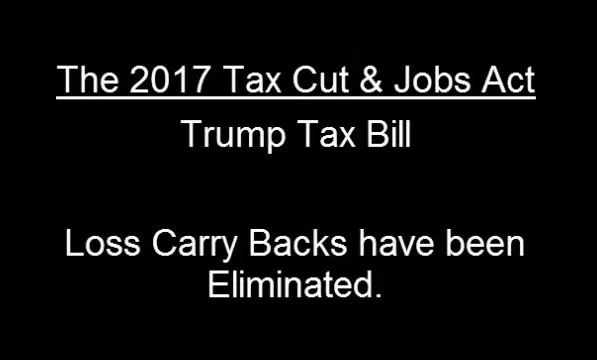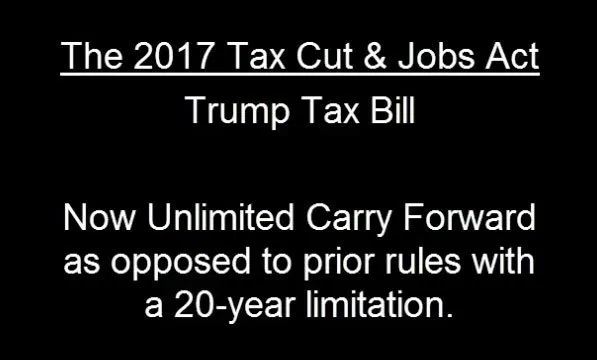Are Ponzi Scheme Losses Tax Deductible in 2018?
First of all, with the elimination of Loss Carry Backs under the new Tax Cut and Jobs Act, it is important for Ponzi Scheme losses that could be deducted in 2016 – 2017 be carefully studied.
Either you can take a deduction in a particular year and file amended returns. Or if you are prior to the Trump 2017 Tax Cut and Jobs Act, the refund that you can get will be as high as 37% for each dollar of loss going forward. For losses that you’re going to claim prior to 2010- 2018 you could have up to 39.6% plus the Obamacare tax, plus in many states where you pay state income taxes you’re going to be able to get a refund from your state income taxes.
These refunds might have a little lower value going forward because of the reduced tax rates under the Trump tax bill.

Today we have reduced tax rates and victims cannot make use of the loss carry backs. The other changes are that you can continue to carry your losses forward as long as is necessary. There is no longer just a 20 year limitation until your recovery of losses going forward runs out.

Finally, it is critical if you have a higher tax bracket losses prior to the year to 2018 that you claim as much of those losses in the prior years as possible. This means for most taxpayers at this point, late in the game that carry back refunds can be achieved for the year 2016, 2017 possibly 2015 for certain Ponzi losses. It’s also critical to be able to substantiate the discovery of the fraud in a prior year to maximize the amount to be recovered. This depends upon when the reasonable prospect of recovery no longer exists.
Frequently Asked Questions
1. How much can be claimed if there is a Ponzi Scheme Theft loss?
Correct Answer: The amount of the theft loss that is deductible is calculated as the tax basis of the lost asset reduced by insurance proceeds recoverable and other claims for which there is a reasonable prospect of recovery.
2. Is a Ponzi Scheme theft loss deductible as a capital gains or ordinary income?
Correct Answer: The investor is entitled to an ordinary loss rather than just a capital loss. The IRS considered a Ponzi scheme theft loss to be a loss that is incurred in a transaction entered into for profit.
3. How many years may a theft loss be carried back from the year the loss is reported under the Trump 2017 Tax Cut and Jobs Act?
Correct Answer: The investment theft loss forms part of the taxpayer’s operating loss that may be only carried forward under normal net operating loss rules.
4. When should a theft loss be claimed as a deduction?
Correct Answer: A theft loss is not deductible in the taxable year in which the theft was discovered to the extent that a claim for reimbursement exists and there is a reasonable prospect of recovery of the loss.
5. Is there an IRS procedure that expedites the deduction of theft losses from a Ponzi scheme? If so, what is it called?
Correct Answer: The IRS provided a “safe harbor” that offers thousands of Ponzi scheme victims a badly needed uncomplicated shortcut cash refunds from tax losses.
6. What is a theft loss for I.R.S. deduction purposes?
Correct Answer: The taking of property with criminal intent – Must have criminal intent
7. How much of a loss deduction can be claimed from a Ponzi Scheme loss?
Correct Answer: 100% – Ponzi Scheme losses are a result of a trade or business or other profit seeking motives and are deductible for the entire loss
Glossary
Ponzi Scheme Tax Recovery Terms
- Ponzi Scheme: A fraudulent investment scheme where investors think they are being paid profit but are actually being paid only from other persons’ investments who have been defrauded
- Safe Harbor: An I.R.S. term that allows taxpayers who meet certain standards to benefit from tax relief
- Phantom income: False income that does not exist that is reported for tax purposes
- Reasonable Prospect of Recovery: A standard used for investment losses that may be recovered
- Year of Discovery: The year in which a theft loss is incurred
- Amended Returns: Tax returns that are filed after the original tax return is found to be inaccurate and must be replaced
- Ascertainable Standard: A standard by which one may determine that an investment loss may or may not be recovered until a later date

